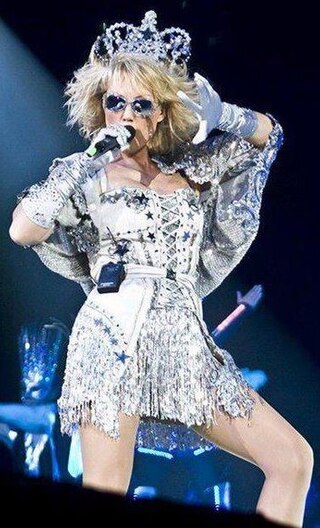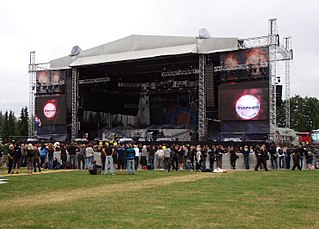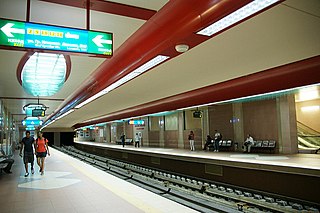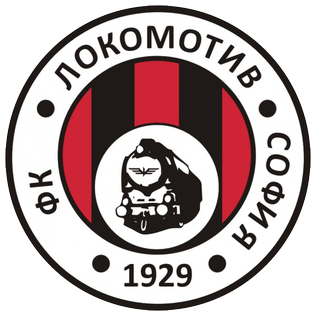
Fahreta Živojinović, known by her stage name Lepa Brena, is a Yugoslav singer, actress, and businesswoman. With around 40 million sold records, she is regarded as the commercially most successful recording artist from the former Yugoslavia. Brena is also often credited with creating the turbo-folk genre with her first two albums Čačak, Čačak (1982) and Mile voli disko (1982).

PFC Levski Sofia is a Bulgarian professional association football club based in Sofia, which competes in the First League, the top division of the Bulgarian football league system. The club was founded on 24 May 1914 by a group of high school students, and is named after Vasil Levski, a Bulgarian revolutionary renowned as the national hero of the country.

CSKA Sofia is a Bulgarian professional association football club based in Sofia and currently competing in the country's premier football competition, the First League. CSKA is an abbreviation for Central Sports Club of the Army, named after the Bulgarian Army. CSKA is the most successful football club of Bulgaria according to the Europe's Club of the Century ranking of the International Federation of Football History & Statistics (IFFHS).

Georgi Asparuhov Stadium, nicknamed Gerena, is a multi-purpose stadium situated in the Suhata reka neighbourhood of the Bulgarian capital Sofia. Named after the legendary Bulgarian footballer Georgi Asparuhov (1943–1971), it has been the home ground of Bulgarian association football club Levski Sofia since its opening in 1963.

Stadion Plovdiv is a multi-purpose stadium in Plovdiv, Bulgaria. It is currently used mostly for athletics championships. The stadium holds 55,000 since 2008. The stadium was built in 1950.

Stadion Balgarska Armia is a stadium of the Bulgarian football club CSKA Sofia. It's situated in the Borisova gradina in the centre of Sofia. Until 2024 the stadium had four sectors and a total of 22,995 (18,495) seats, of which 2,100 are covered; the pitch length was 106 meters and the width was 66 meters.

The Eternal derby of Bulgarian football or simply The Eternal derby is the name of the local derby football match between the two most popular and successful football clubs in Sofia and Bulgaria: Levski Sofia and CSKA Sofia. The dominant forces in Bulgarian football have won 26 and 31 national championship titles and 26 and 21 Bulgarian Cup titles, involved into 13 and 11 Doubles, respectively. The rivalry was chosen by COPA90 as the 2nd Maddest Derby in Eastern Europe.

The Tallinn Song Festival Grounds are the grounds on which the Estonian Song Festival "Laulupidu" is held every five years.

The World Magnetic Tour was a 2008–2010 concert tour by American heavy metal band Metallica in support of the band's ninth studio album, Death Magnetic, which was released on September 12, 2008.

The Sonisphere Festival was a touring rock music festival which took place across Europe between the months of June and August. The festival was owned by John Jackson and Kilimanjaro Live. It was jointly promoted by K2 and Kilimanjaro Live. It hosted heavy metal bands such as Iron Maiden, Metallica, Mötley Crüe, Slayer, Judas Priest, Megadeth, Avenged Sevenfold and Babymetal.

Sofia University St. Kliment Ohridski Metro Station is a station on the Sofia Metro in Bulgaria. It was introduced into service on September 7, 2009. On 26 August 2020, transfer to Orlov Most on M3 line was opened.

Vasil Levski Stadium Metro Station is a station on the Sofia Metro in Bulgaria. It was introduced into service on 8 May 2009. It serves the Vasil Levski National Stadium and New CSKA Sofia Stadium. The architectural layout was created by architects Kr. Andreev and D. Mushev.

The Big Four: Live from Sofia, Bulgaria is a live video with performances by Metallica, Slayer, Megadeth, and Anthrax, the "big four" of American thrash metal. The concert took place on June 22, 2010, at the Sonisphere Festival at Vasil Levski National Stadium, Sofia, Bulgaria. It was shown at 450 movie theaters in the United States and over 350 movie theaters across Europe, Canada, and Latin America on June 22, 2010.

Yunak Stadium, was a multi-use stadium in central Sofia, Bulgaria. It was located at the north-western corner of Knyaz Boris's Garden, on the southern bank of the Perlovska river. It was the largest stadium in Bulgaria until the middle of the 20th century, with a capacity of 35,000 spectators, and was initially used as the main stadium for Bulgaria national football team matches. The pitch was almost exactly square-shaped, with four straight rows of stands on all sides.

The Maiden England World Tour was a concert tour by Iron Maiden, which began on 21 June 2012 in Charlotte, North Carolina and ended on 5 July 2014 with a performance at the Sonisphere Festival at Knebworth, UK. The tour's setlist was largely based on the original 1989 concert video of the same name, shot during the Seventh Tour of a Seventh Tour in 1988, which was re-released in 2013. Because of this, the tour's setlist consisted almost entirely of the band's 1980s material, with a particular focus on their 1988 album, Seventh Son of a Seventh Son. The stage show was also based on the original tour and featured numerous pyrotechnic effects in addition to multiple appearances by the band's mascot, Eddie. Following 2005's Eddie Rips Up the World Tour and 2008–2009's Somewhere Back in Time World Tour, this was the group's third tour inspired by a particular period of their history.

The Začarani krug Tour was a tour by Serbian singer Lepa Brena, and was staged in support of her sixteenth studio album, Začarani krug (2011). Comprising 104 shows, the tour visited Europe and North America. It began on October 20, 2011, in Belgrade, Serbia, at the Kombank Arena and concluded on September 29, 2017, in London, England at Troxy. During the tour she held the biggest concert of her career. The concert in Prilep was attended by more than 200,000 people. It was officially announced in May 2011, with dates for Balkan venues revealed. The tour was also included some festival concerts.
The 1953 Bulgarian Cup final was the 13th final of the Bulgarian Cup, and was contested between Lokomotiv Sofia and Levski Sofia on 25 November 1953 at Vasil Levski National Stadium in Sofia. Lokomotiv won the final 2–1, claiming their second national cup title.

FC Lokomotiv Sofia is a Bulgarian professional association football club based in Sofia, which currently plays in the First League, the top tier of Bulgarian football.
The 1953 Bulgarian Cup was the 13th season of the Bulgarian Cup. Lokomotiv Sofia won the competition, beating Levski Sofia 2–1 in the final at the Vasil Levski National Stadium in Sofia.

The 2018 Bulgarian Cup final was the final match of the 2017–18 Bulgarian Cup and the 78th final of the Bulgarian Cup. The final took place on 9 May 2018 at Vasil Levski National Stadium in Sofia. It was refereed by Nikola Popov.




















